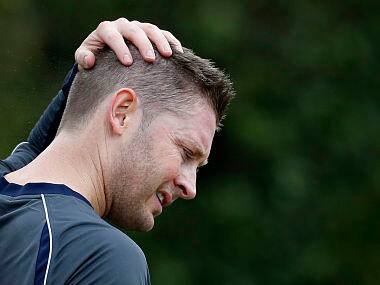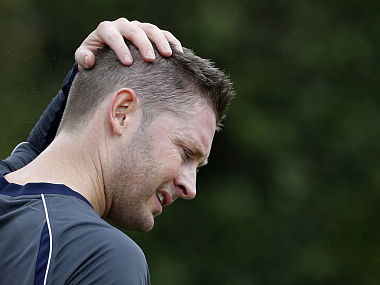You can’t hide from the truth forever. Eventually, it finds a way to hit you in the face. Australia is no longer a good cricket team. The side’s unceremonious exit from the Champions Trophy – one point and no wins from three games – is merely the latest exhibit in a string of recent poor results. Let’s face it; the names on Australia’s team sheet no longer scare the opposition. Michael Clarke, when he is not battling a bad back, is a world class batsman. Shane Watson has twice been Australia’s cricketer of the year, but has been out of sorts lately and troubled by injuries. Mitchell Johnson can sometimes produce spells of breathtaking fast bowling. And that’s about it. The likes of Xavier Dougherty and George Bailey, decent men that they are, are more likely to have the opposition wondering who they are, than how to counter them. [caption id=“attachment_883281” align=“alignleft” width=“380”]  Michael Clarke, when he is fit enough to play, is the only superstar in Australia’s line-up. Reuters[/caption] Against Sri Lanka at the Oval in last night’s Champions Trophy match, Australia needed to chase 254 in 29.1 overs to qualify for the semifinals. They lost Shane Watson in the second over. As Jarod Kimber pointed out on ESPNcricinfo, that left Glenn Maxwell and Phillip Hughes – the same Hughes that looked like a trembling rabbit facing a hawk while playing in India – to lift Australia. He also put the pair in context. “Trumper and Hill. Ponsford and Bradman. Simpson and Chappell. Taylor and Boon. Hayden and Ponting. Australia have had some pretty special top orders. Hughes and Maxwell won’t be added to that list.” It isn’t the case that Australia is picking the wrong players either. As Kimber points out, Hughes averages 48 in List A cricket while Maxwell can bash the ball a long way. They actually are the best Australia can muster at the moment and therein lies the problem: The seemingly inexhaustible pipeline of talent appears to have gone dry. Losing also begets problems off the field. David Warner has been in the news for taking a virtual pop at Australian journalists on Twitter, and then an actual pop at Joe Root in a bar at 2:30 am. The first led to a fine. The second led to a fine and a suspension from the team. Warner’s spot in the Ashes side is now in jeopardy and raises questions about his reputation as a future Aussie captain. Matthew Wade got into an ugly spat with Mahela Jaywardene after Sri Lanka beat Australia by two runs in a Twenty20 international back in January. The India tour gave the world ‘Homeworkgate’, with then vice-captain Watson and three other players suspended for a Test for not submitting written assignments on how to improve the team’s performance. It is hard to imagine Steve Waugh or Ricky Ponting’s all-conquering sides producing a similar fiasco. Sure there were troubles with Shane Warne – he was banned for a year for taking a prohibited substance – but Warne was a larger-than-life character who backed it up with performances on the field. It wasn’t all that long ago that Australia was thrashing India 4-0 at home. There were plenty of calls then for India to adopt Australia’s approach to nurturing and producing cricketers. Now the wheel has turned 180 degrees. It is India’s depth (especially the batting) that is being praised, while Australia’s captain George Bailey had admitted his side is low on confidence. The truth is sporting success comes in cycles. No team in any sport dominates forever. Brazil won three out of four football World Cups between 1958 and 1970. They wouldn’t win another one until 1994. The West Indies won the first two cricket World Cups in 1975 and 1979. They have yet to win a third. The Boston Celtics won 15 NBA championships over a 30-year span from 1957 to 1986. They have won just one title since and had to wait 22 years to do so. There is an ebb and flow to sports that is one of the reasons it is worth watching. If the same team were to win over and over again, it would make sports predictable and boring. And once a team falls off the peak, it needs to find its own way back to the top of the mountain. There is no cookie cutter, one-size-fits-all approach. India’s size and the vastness of her population makes her ill suited to aping Australia, a country with just six first-class teams. The same applies in reverse. Australia were not a good team in the mid-1980s. Allan Border endured plenty of losing before he turned revived the team’s fortunes. It will be a similar story this time around. But the first step is recognising that they are not what they used to be. Only then can the resurrection begin.
The likes of Xavier Doherty and George Bailey, decent men that they are, are more likely to have the opposition wondering who they are than how to counter them.
Advertisement
End of Article
Written by Tariq Engineer
Tariq Engineer is a sports tragic who willingly forgoes sleep for the pleasure of watching live events around the globe on television. His dream is to attend all four tennis Grand Slams and all four golf Grand Slams in the same year, though he is prepared to settle for Wimbledon and the Masters. see more


)

)
)
)
)
)
)
)
)



